Summary 
A superbly directed and costumed outdoor production with an excellent portrayal of a lean and handsome Richard anchored by a slew of strong supporting performances. Updated to a time right around World War I, the production provides a dramatization of the rise and fall of a cruel and insane dictator rather than a portrait of evil. Consistently insightful and powerful theatre.
Design
Directed by James DeVita. Costume design by Rachel Anne Healy. Scenic design by Takeshi Kata. Lighting design by Michael A. Peterson. Sound design and original music by Josh Schmidt.
Cast
Sarah Day (Duchess), Michael Huftile (King Edward IV), John Taylor Phillips (Clarence), James Ridge (Richard), Colleen Madden (Elizabeth), Will Mobley (Rivers), Samuel Ashdown (Grey), David Daniel (Buckingham), Steve Haggard (Hastings), Laura Rook (Mistress Shore), Nate Burger (Catesby), Eric Parks (Ratcliff), Travis A. Knight (Richmond).
Analysis
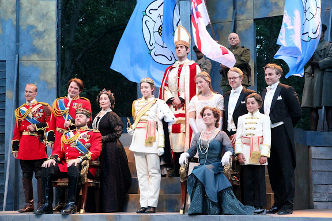
James DeVita directs Richard III, the meticulously crafted highlight of the American Players Theatre season, an evening performance in August under an ominous mass of rainclouds, befitting the themes of the play. DeVita begins with a prologue from 3 Henry VI, the victorious Yorks gathered as if for a family portrait, the heavily-medaled Richard in crimson military uniform. James Ridge plays Richard, tall and lanky with fine short-cropped hair, a far cry from the usual demonically twisted embodiment of evil. He wears one arm in a sling and shows a slight limp, but there is no hunchback, just a leather shoulder pad. The era is that of World War I, and the costuming is superb: gowns and suits Edwardian; the military officers in fitted dress uniforms; the soldiers in green wool overcoats and wrapped boots, carrying side-arms and long rifles with bayonets. Hastings and Elizabeth's brothers are formally attired, the latter gentlemen in tailed tuxedoes with vests and handkerchiefs, differentiated by eyeglasses for one and a cigarette case for the other.
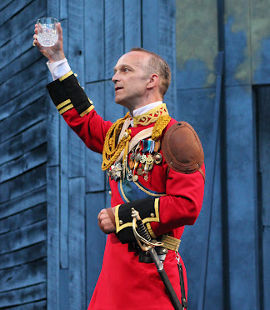
The York family marches offstage, but Ridge's Richard lingers, spitting "weak pipes of peace" and revealing himself as less evil than simply sociopathic, shushing the audience with a conspiratorial finger to his lips ("dive, thoughts"). Ridge's performance fascinates, his Richard alternating from stoic soldier deceiving his about-to-be-murdered brother - and gifting him solemnly with a silver flask - to bug-eyed villain scampering after the Queen's ineffectual brother. This Richard slowly becomes unhinged, more anxious and agitated with each victory, turning to look at nothing, pausing as if to hear something that is not there. He dispatches his enemies with help from the Cat and the Rat - Catesby and Ratcliff - brutes who pull on gloves and lay out a tarp before garroting the King's brother from behind.
The improbable 1.2 wooing of the statuesque Lady Anne begins with soldiers bearing a stretcher. Anne, tall and poised like a 1920s Hollywood icon, removes her veil and curses Richard, then spits in his face, rejecting an attempted kiss with a disgusted shove. But Ridge's Richard breaks her down emotionally, giving her his dagger as he kneels, and in moments she is stopping him from slitting his own throat and kneeling herself to embrace him. They seal their union not just with a kiss, but with a writhing series of kisses and moans, and when she exits, Ridge's Richard exults with a crowing yelp of triumph, scarcely believing his own success. Wild-eyed and manic, he strides around the stage, yelling again as he exits, slamming a wall with his good arm. Anne is present 2.4 and appalled at Richard's sending of the Princes to the tower, and later in 4.2, when Richard plots Anne's demise - "rumor it abroad that Anne, my wife, is very grievous sick" - DeVita has her still seated beside him on her throne, overhearing and horrified, in a moment of characteristically delicious cruelty.
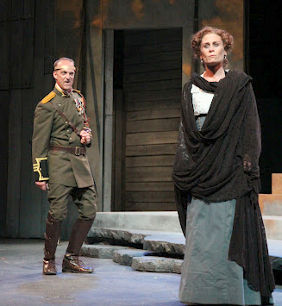
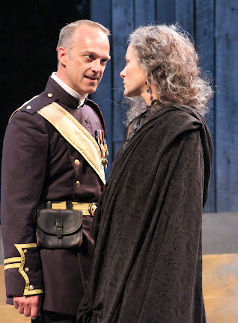
King Edward is another target, slumped in his wheelchair with dark circles around reddened eyes and a ghastly pale face, but it is the York women who eventually undo Richard. DeVita elicits strong supporting performances from all, even adding non-speaking roles like Elizabeth's pretty young daughter and Hastings's girlfriend Jane Shore. Most memorable is Tracy Michelle Arnold's wraithlike Margaret, a dark-eyed and crazy-haired witch wearing a black gown and speaking in a tremulous but haunting voice. She silently watches the prologue from upstage, and in 1.3 she overhears the fears of Elizabeth and her brothers before stepping forward to curse them all. Arnold exits to spontaneous applause, and her return in 4.5 is even more searing, her speech rendering Richard speechless and inspiring the nearly-defeated Elizabeth, who in hearing Margaret's words of defiance, rises to her knees, clasps her hands in prayer, and looks to the heavens.
Ridge's Richard dominates the production, his Richard reinforcing the sudden arrest of Hastings - "talk to me of if!" - via a hasty barricade of the castle gates with the council chairs, wielding a rifle in panicked "defense" of the throne. DeVita's direction impresses, with scenes ranging from Lady Anne chasing Richard around the corpse of her father, to the painting-like image of Elizabeth and her fleeing family 2.1, to the revelation of the two hooded and praying monks as his trusted henchmen, to Ridge's Richard plopping down on his throne with undisguised glee: "King Richard, seated!" DeVita imbues other moments with a combination of insight and theatricality: in 1.4 George laughs at the intrusion of his murderers, then makes a slow and awful realization; Prince Edward nearly breaks down in 2.4 tears at the prospect of the Tower; Rivers and Grey, their hands bound behind them, stagger and snivel and plea for their lives in 3.3; the Mayor of London reluctantly capitulates to Richard - "in your just ... cause" - in a 3.5 indication of political weakness; and in 4.3 Tyrrell weeps over his murder of the Princes, unable to even utter the words, "Abraham's bosom." DeVita's conception of Richard III plays much like the world closing in on Macbeth - "sin will pluck on sin," Ridge's Richard acknowledges in 4.2, much like Macbeth's 3.4 "blood will have blood" - and by 4.5 Richard is buffeted by messengers with bad political news, just like the doomed Scottish King.
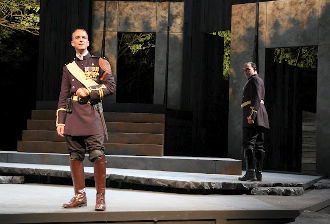
Droplets of rain can be felt before intermission, and the break is extended as rain begins to fall in earnest, but the cast and crew bravely continue into the second half. DeVita provides a visceral shock at 5.1, the arrested Buckingham brought onstage but suddenly garroted from behind. The gruesome execution, with a struggle including flailing and kicking of the feet, is difficult to watch but certainly dramatically effective. The conclusion begins 5.2 with Richmond downstage left, setting up camp opposite Richard, Ridge writhing on a cot in ghastly yellow light as ghosts stand over him. DeVita handles the ghosts with expert quickness and dramatic ease, the ghosts with scarlet-red blindfolds over their eyes, their curses following one another rapidly - "despair and die" - but without the accompanying benediction of Richmond.
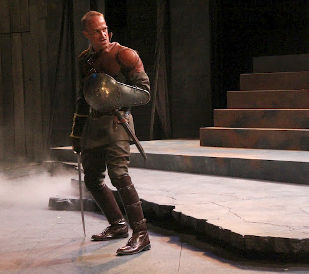
Armored 5.3 by Ratcliff, Ridge's Richard whimpers in pain as his bad arm is braced into a makeshift shield, and despair is already evident in his expression: about the lack of a rising sun, Richard complains, "he disdains to shine." Combat sequences play with frightening speed on the rain-slickened stage, a credit to the performers and their training. The battles begin 5.4 with the ominous sound of quickly approaching horses, and DeVita freeze frames at one point, returning to full speed again with a volley of gunfire, then building the surreal nature of the conflict by slowing to slow-motion. Ridge's Richard is finally beset upon, his "a horse, a horse, my kingdom for a horse!" a cry of panic. Surrounded 5.5 by Richmond's soldiers and confronted again by the ghosts, Ridge's Richard chooses not to fight but instead impales himself on his sword. DeVita concludes his exceptional and insightful production not just with Richmond's pronouncements on the end of the War of the Roses, but with the happy reunion of Stanley and his ransomed son.
A version of this article was edited and published in Shakespeare Bulletin, Vol.30, No.4, Winter 2012